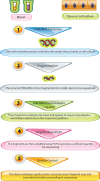Next-generation sequencing in cancer diagnosis and treatment: clinical applications and future directions
- PMID: 40253661
- PMCID: PMC12009796
- DOI: 10.1007/s12672-025-01816-9
Next-generation sequencing in cancer diagnosis and treatment: clinical applications and future directions
Abstract
Next-generation sequencing (NGS) has emerged as a pivotal technology in the field of oncology, transforming the approach to cancer diagnosis and treatment. This paper provides a comprehensive overview of the integration of NGS into clinical settings, emphasizing its significant contributions to precision medicine. NGS enables detailed genomic profiling of tumors, identifying genetic alterations that drive cancer progression and facilitating personalized treatment plans targeting specific mutations, thereby improving patient outcomes. This capability facilitates the development of personalized treatment plans targeting specific mutations, leading to improved patient outcomes and the potential for better prognosis. The application of NGS extends beyond identifying actionable mutations; it is instrumental in detecting hereditary cancer syndromes, thus aiding in early diagnosis and preventive strategies. Furthermore, NGS plays a crucial role in monitoring minimal residual disease, offering a sensitive method to detect cancer recurrence at an early stage. Its use in guiding immunotherapy by identifying biomarkers that predict response to treatment is also highlighted. Ethical issues related to genetic testing, such as concerns around patient consent and data privacy, are also important considerations that need to be addressed for the broader implementation of NGS. These include the complexities of data interpretation, the need for robust bioinformatics support, cost considerations, and ethical issues related to genetic testing. Addressing these challenges is essential for the widespread adoption of NGS. Looking forward, advancements such as single-cell sequencing and liquid biopsies promise to further enhance the precision of cancer diagnostics and treatment. This review emphasizes the transformative impact of NGS in oncology and advocates for its incorporation into routine clinical practice to promote molecularly driven cancer care.
Keywords: Biomarkers; Cancer diagnosis; Cancer treatment; Genomic profiling; Next-generation sequencing; Precision oncology.
© 2025. The Author(s).
Conflict of interest statement
Declarations. Ethics approval and consent to participate: Not applicable. Consent for publication: Not applicable. Competing interests: The authors declare no competing interests.
Figures
Similar articles
-
From Genomic Exploration to Personalized Treatment: Next-Generation Sequencing in Oncology.Curr Issues Mol Biol. 2024 Nov 6;46(11):12527-12549. doi: 10.3390/cimb46110744. Curr Issues Mol Biol. 2024. PMID: 39590338 Free PMC article. Review.
-
Unlocking the future of cancer diagnosis - promises and challenges of ctDNA-based liquid biopsies in non-small cell lung cancer.Transl Res. 2024 Oct;272:41-53. doi: 10.1016/j.trsl.2024.05.014. Epub 2024 Jun 3. Transl Res. 2024. PMID: 38838851 Review.
-
Genetic Profiling of Acute and Chronic Leukemia via Next-Generation Sequencing: Current Insights and Future Perspectives.Hematol Rep. 2025 Mar 28;17(2):18. doi: 10.3390/hematolrep17020018. Hematol Rep. 2025. PMID: 40277842 Free PMC article. Review.
-
Next-Generation sequencing transforming clinical practice and precision medicine.Clin Chim Acta. 2023 Nov 1;551:117568. doi: 10.1016/j.cca.2023.117568. Epub 2023 Oct 13. Clin Chim Acta. 2023. PMID: 37839516 Review.
-
Precision oncology platforms: practical strategies for genomic database utilization in cancer treatment.Mol Cytogenet. 2024 Nov 14;17(1):28. doi: 10.1186/s13039-024-00698-w. Mol Cytogenet. 2024. PMID: 39543667 Free PMC article. Review.
Cited by
-
The $10 proteome: low-cost, deep and quantitative proteome profiling of limited sample amounts using the Orbitrap Astral and timsTOF Ultra 2 mass spectrometers.bioRxiv [Preprint]. 2025 Jul 31:2025.07.29.667408. doi: 10.1101/2025.07.29.667408. bioRxiv. 2025. PMID: 40766599 Free PMC article. Preprint.
-
Next-Generation Cancer Treatment: Photoimmunotherapy's Promise for Unresectable Head and Neck Cancers.Pharmaceutics. 2025 May 29;17(6):716. doi: 10.3390/pharmaceutics17060716. Pharmaceutics. 2025. PMID: 40574027 Free PMC article. Review.
-
Unlocking glioblastoma: breakthroughs in molecular mechanisms and next-generation therapies.Med Oncol. 2025 Jun 21;42(7):276. doi: 10.1007/s12032-025-02830-1. Med Oncol. 2025. PMID: 40542948 Free PMC article. Review.
-
The impact of liquid biopsy in breast cancer: Redefining the landscape of non-invasive precision oncology.J Liq Biopsy. 2025 May 21;8:100299. doi: 10.1016/j.jlb.2025.100299. eCollection 2025 Jun. J Liq Biopsy. 2025. PMID: 40521566 Free PMC article. Review.
References
-
- Popova L, Carabetta VJ. The use of next-generation sequencing in personalized medicine. ArXiv; 2024. - PubMed
-
- Kumar KR, Cowley MJ, Davis RL. Next-generation sequencing and emerging technologies. In: Seminars in thrombosis and hemostasis. Thieme Medical Publishers; 2024. - PubMed
-
- Pasmans CT, Tops BB, Steeghs EM, Coupé VM, Grünberg K, de Jong EK, Schuuring EM, Willems SM, Ligtenberg MJ, Retèl VP, van Snellenberg H. Micro-costing diagnostics in oncology: from single-gene testing to whole-genome sequencing. Expert Rev Pharmacoecon Outcomes Res. 2021;21(3):413–4. - PubMed
-
- Kulkarni N, Tank S, Korlekar P, Shidhaye S, Barve P. A review of gene mutations, conventional testing and novel approaches to cancer screening. Int J Exp Res Rev. 2023;30:134–62.
Publication types
LinkOut - more resources
Full Text Sources

